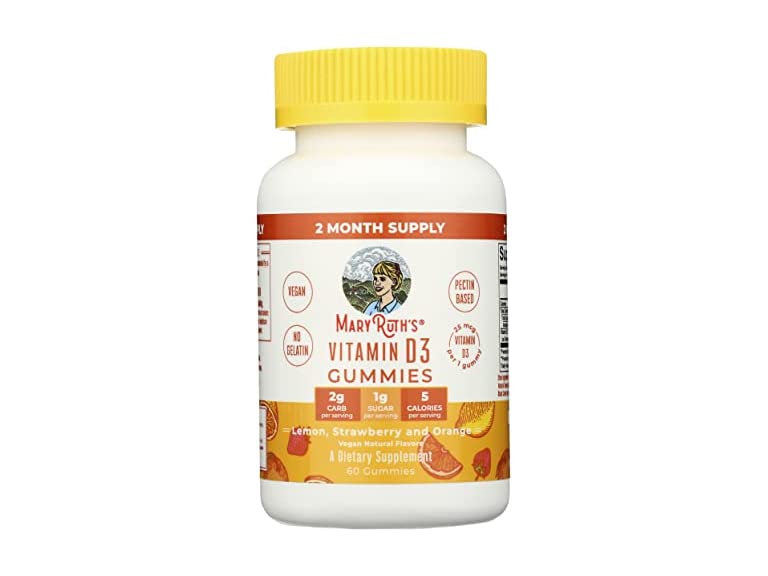MaryRuth Organics Vitamin D3 Gummies
$22.46
$29.95
25% off
Reference Price
Condition: New
Size: 60 Gummies
Flavor: Lemon, Strawberry & Orange
Top positive review
No Artifical Sweeteners!!!
By Christina on Reviewed in the United States on March 24, 2025
It’s our family’s favorite Vitamin D! The kids love the taste and it’s a huge plus the ingredients don’t include any artificial sweeteners. The texture is chewy enough my kids can chew without difficulty. It’s now a staple in our home.
Top critical review
3 people found this helpful
Non-trivially more expensive than other lichen-based gummies
By Abbe on Reviewed in the United States on January 30, 2023
The natural source of vitamin D3 [cholecalciferol] is unfiltered sun exposure; UV-B rays penetrate uncovered skin and produces D3, but this is affected by many factors. Very few foods naturally have vitamin D, and those that do are not frequently consumed in North America. SOURCE. This is a private-label supplement from an unspecified gummy manufacturer whose own D3-from-lichen supplier is also unspecified at the time of this writing. Nonetheless, the ingredients and country of origin listed on the label indicate these gummies are made by Health Specialties Manufacturing Inc (subsidiary of the GHT Companies, a NV corporation sited in CA), licensed in Canada to manufacture, package, label, and import health products, while the D3 is sourced from ESB Developments Ltd (UK), owner of the Vitashine D3 trademark. They are sold here by the distributor and retail labeller MRO MaryRuth LLC (a DE company with virtual address in CA, also doing business as MaryRuth Organics), via the FBA storefront of the online-retailer Seven Boulders LLC (NY). The expiration date stamped on the bottle, shown in one of my figures, is unclear at first sight, since the manufacture date (11/2023) follows 'EXP' in the second line, while the actual expiry is in the third line and given with a different year format (11/26) plus time of the day. ORIGIN. The vitamin is extracted with alcohol from lichens (organisms consisting of fungi and algae in a symbiosis), and added to a vegetable oil carrier. Lichen-D3 production varies with the season and lichen species -- some, like the reindeer lichens, have subspecies with both vitamin D2 [ergosterol] and D3. Species variability in the amount and the vitamin analoge is also found in algae, which synthetize vitamin D as well. At the time of this writing, the lichen species used for this product is not identified on its label although the FDA's rule 21 CFR 101.4(h) requires that "a supplement that contains one or more botanical ingredients (including fungi and algae) state the common or usual name for each of these ingredients on the label." ESB does not disclose its boreal lichen species as well, but it is likely reindeer lichen (also called 'reindeer moss' in Scotland). DOSE. These gummies provide 25 μg (1000 IU) of the vitamin D, which is well suited for children. The dietary allowance recommended by the Institute of Medicine is 15 μg (600 IU) between 1 and 70 years of age, but, since 2008, pediatricians warn of a deficient vitamin D intake among children and adolescents -- the NHANES data (2011–2014) show 6.6% of those aged 1–5, 12.3% of those aged 6–11, and 22.7% of those aged 12–19 years are at risk of subclinical vitamin D deficiency in the US. Supplementation is particularly needed for children who use sunscreen; who live above the 40th latitude; who have dark skin; who are obese; who do not drink milk; who rarely go outside; or who wear clothing covering most of the skin. Those with chronic fat malabsorption or using medications blocking vitamin D also need supplementation. PRICING. Vegan D3 supplementation is not cheap. My other figure compares price parameters of this brand to those of other 8 brands of plant-based D3 supplements *without other active ingredients and with doses suitable for children*, which I found on Amazon at the time of the review. They include various dispensing formats (drops, capsule, tablet, and gummy), and are anonymized as A through H; the MaryRuth brand values are at the right-most column in red font. The comparison does not favor the brand, which is in the upper end of the range of price metrics per bottle, per dose, and per 100 UI of D3. Other lichen-based gummies are significantly less expensive and do not list potential allergens like the coconut oil in this brand. POTENTIAL RISKS. Unlike D3's skin production by sun exposure (which cannot cause vitamin D intoxication by overexposure, as sunlight itself destroys any excess of the vitamin), there are *rare* but potentially serious intoxication risks when taking in too much vitamin D. By and large, parents should ensure the TOTAL amount (diet plus supplements) of ingested vitamin D does not exceed 1000 to 1500 IU/day for infants, 2500 to 3000 IU/day for ages 1-8, and 4000 IU a day for ages 9 and older. For estimating the total, keep in mind that fortified foods (cow milk primarily, but some cereals and juices as well) provide much of the vitamin D needs in North America : nearly all milk in the US is voluntarily D3-fortified up to 84 IU/100 ml, while milk is mandatorily fortified in Canada (80 IU/100 ml) and Mexico (20-30 IU/100 ml). --
Sort by:
Filter by:
Sorry, no reviews match your current selections.
Try clearing or changing some filters.Show all reviews
Show more reviews
